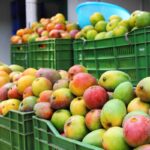Peruvian mango industry 'optimistic' for upcoming export deal
The Association of Peruvian Mango Exporters (APEM) expects a 40% rise in shipments this upcoming 2012-13 season from November to March. 
APEM president Juan Carlos Rivera told www.freshfruitportal.com the volume was much higher than previous estimations.
"During winter, which was late, we thought we were going to have similar production to last year - 70,000 metric tons (MT) - but then the weather changed," Rivera said.
He said El Niño retreated from the Peruvian coast, with weather conditions returning to normal with lower temperatures.
"With the cold that took place during the month of August, mango trees reacted and started to flower, and that's why our expectations changed from pessimistic to optimistic.
Based on APEM's preliminary September forecast, export production volume could be similar to the 100,000MT reached in 2009-10 season, which is still less than the 130,000MT figure achieved in 2010-11.
He said the campaign would start in weeks 48 and 49 with more significant volumes kicking off in in January.
"The first shipments will be mainly to Europe. We'll go to the U.S. more into the campaign, we're talking about mid-December.
"The main markets will definitely be Europe and the U.S. The problem with Asia is that we don't have ships that can arrive in a timely way so that fruit maintains its quality."
Rivera said the industry was still looking for faster transport alternatives that could allow Peruvian mangoes to arrive in Asia sooner.
"We have great hopes in Asia but we have difficulties. One way is by multi-modal transport, from the port of Paita by sea to Los Angeles, and from Los Angeles to Asia. We are working on that.
He said the industry was also faced with new food safety laws in the U.S.
"These laws will begin to take effect from October this year, and that's a big challenge for a good portion of the exporters who want to be able to implement food safety systems.
He said the U.S.'s Food Safety Modernization Act (FSMA) was being replicated in other markets such as China.
"In Peru we haven't been left behind. What has to be ensured, and that's why there are national entities like SENASA (National Agricultural Health Service), is that they comply with these security procedures so they can continue in the market."
Rivera denied media reports that Peru would definitely start exporting mangoes to South Korea in November 2013. He said the Asian country's Ministry of Agriculture was still conducting a study into the possibility of entry for Peruvian mango entry, which is expected to be released in December.









































